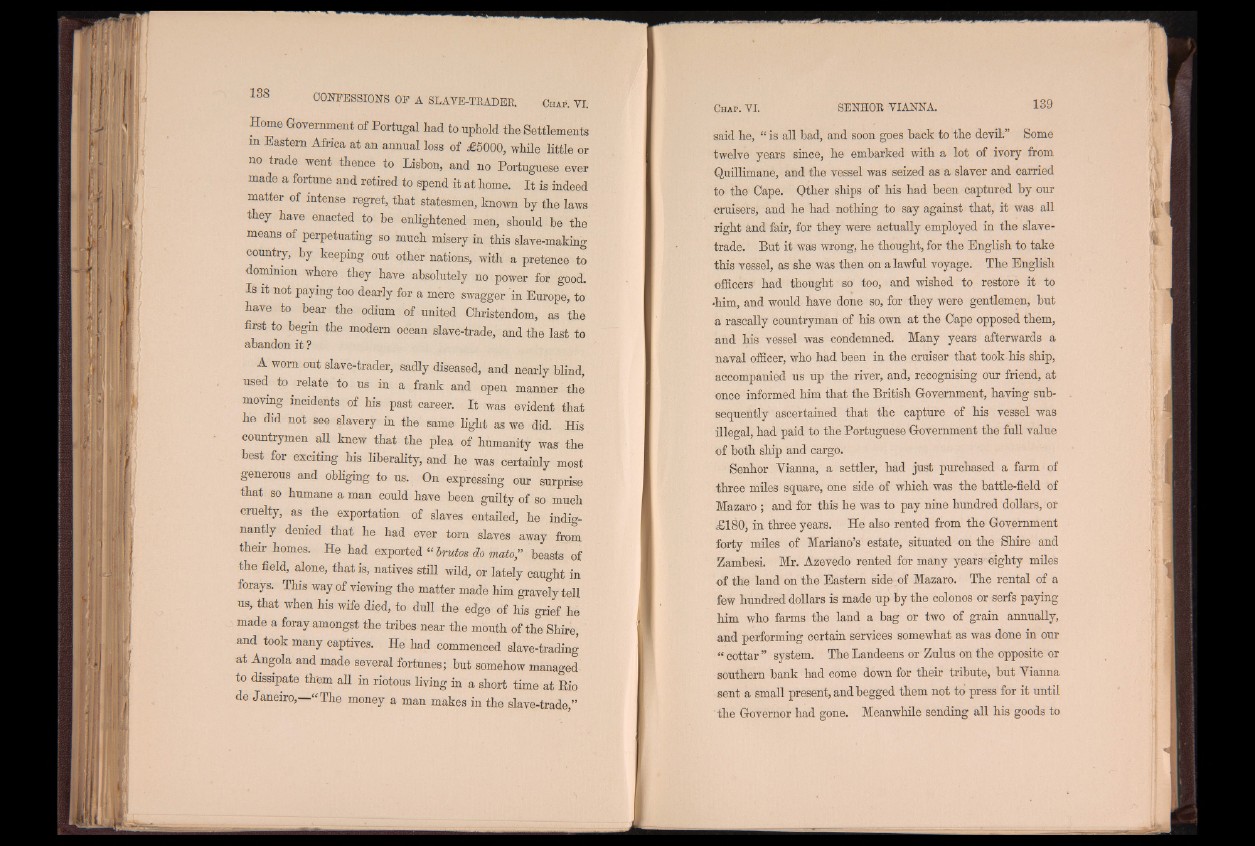
Home Government of Portugal had to uphold the Settlements
m Eastern Africa at an annual loss of £5000, while little or
no trade went thence to Lisbon, and no Portuguese ever
made a fortune and retired to spend it at home. I t is indeed
matter of intense regret, that statesmen, known by the laws
they have enacted to be enlightened men, should be the
means of perpetuating so much misery in this slave-making
country, by keeping out other nations, with a pretence to
dominion where they have absolutely no power for good.
Is it not paying too dearly for a mere swagger in Europe, to
have to bear the odium of united Christendom, as the
first to begin the modem ocean slave-trade, and the last to
abandon it ?
A worn out slave-trader, sadly diseased, and nearly blind,
used to relate to us in a frank and open manner the
moving incidents of his past career. I t was evident that
he did not see slavery in the same light as we did. His
countrymen all knew that the plea of humanity was the
best for exciting his liberality, and he was certainly most
generous and obliging to us. On expressing our surprise
that so humane a man could have been guilty of so much
cruelty, as the exportation of slaves entailed, he indignantly
denied that he had ever tom slaves away from
their homes. He had exported “ brutos do mato” beasts of
the field, alone, that is, natives still wild, or lately caught in
forays. This way of viewing the matter made him gravely tell
us, that when his wife died, to dull the edge of his grief he
made a foray amongst the tribes near the mouth of the Shire,
and took many captives. He had commenced slave-trading
a t Angola and made several fortunes; but somehow managed
to dissipate them all in riotous living in a short time at Eio
de Janeiro,—“ The money a man makes in the slave-trade,”
said he, “ is all bad, and soon goes back to the devil.” Some
twelve years since, he embarked with a lot of ivory from
Quillimane, and the vessel was seized as a slaver and carried
to the Cape. Other ships of his had been captured by our
cruisers, and he had nothing to say against that, it was all
right and fair, for they were actually employed in the slave-
trade. But it was wrong, he thought, for the English to take
this vessel, as she was then on a lawful voyage. The English
officers had thought so too, and wished to restore it to
•him, and would have done so, for they were gentlemen, but
a rascally countryman of his own at the Cape opposed them,
and his vessel was condemned. Many years afterwards a
naval officer, who had been in the cruiser that took his ship,
accompanied us up the river, and, recognising our friend, at
once informed him that the British Government, having subsequently
ascertained that the capture of his vessel was
illegal, had paid to the Portuguese Government the full value
of both ship and cargo.
Senhor Yianna, a settler, had just purchased a farm of
three m ile s square, one side of which was the battle-field of
Mazaro ; and for this he was to pay nine hundred dollars, or
£180, in three years. He also rented from the Government
forty m iles of Mariano’s estate, situated on the Shire and
Zambesi. Mr. Azevedo rented for many years eighty miles
of the land on the Eastern side of Mazaro. The rental of a
few hundred dollars is made up by the colonos or serfs paying
him who farms the land a bag or two of grain annually,
and performing certain services somewhat as was done in our
“ cottar ” system. The Landeens or Zulus on the opposite or
southern bank had come down for their tribute, but Yianna
sent a small present, and begged them not to press for it until
the Governor had gone. Meanwhile sending all his goods to